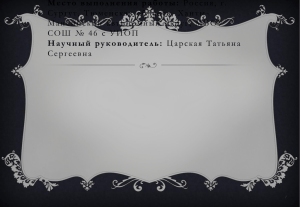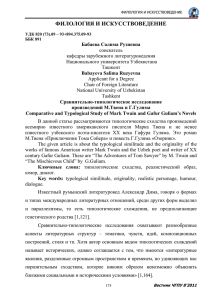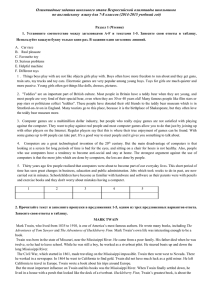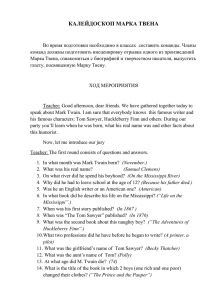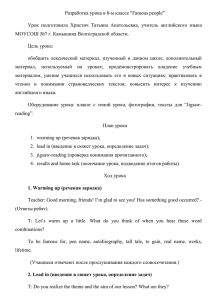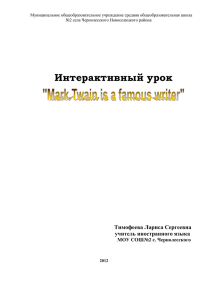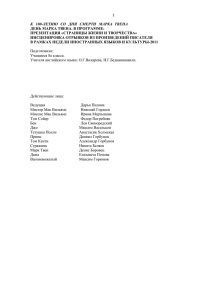MARK TWAIN- Литературный вечер A GREAT AMERICAN WRITER.
реклама
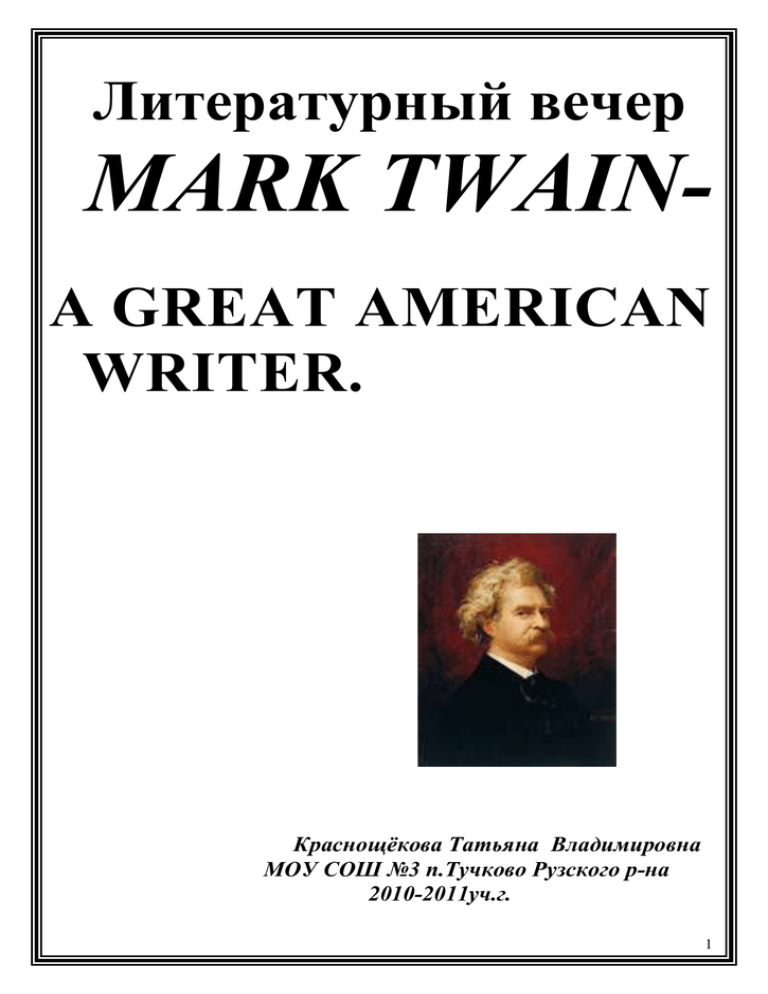
Литературный вечер MARK TWAINA GREAT AMERICAN WRITER. Краснощёкова Татьяна Владимировна МОУ СОШ №3 п.Тучково Рузского р-на 2010-2011уч.г. 1 СОДЕРЖАНИЕ Предисловие…………………………………………………… 2 Методические рекомендации………………………………… 2 Подготовка…………………………………………………….. 4 Программа проведения литературного вечера……………… 4 Краткие сведения из биографии Марка Твена………………. 5 Драматизация шуточных историй из жизни великого писателя……………………………………………. 6 No Ticket for Himself……………………………………….. 6 He didn’t Laugh…………………………………………….. 6 Mark Twain in the Opera…………………………………… 7 One of Mark Twain’s Jokes………………………………… 7 “Home on the Range”………………………………………. 7 VII. Драматизация шуточных историй из жизни великого писателя…………………………………………. 7 Mark Twain and his Doubles……………………………… 8 Mark Twain’s Answer…………………………………….. 9 Mark Twain and a Fishing Inspector…………………….. 9 VIII. Драматизация знаменитого рассказа Марка Твена “Mistaken Identity”………………………..... 10 IX. Литература………………………………………………….. 13 I. II. III. IV V. VI. 2 ПРЕДИСЛОВИЕ Данное пособие предназначается для учащихся средних учебных заведений, гимназий и лицеев. Оно включает материал для внеклассной работы по английскому языку. Внеклассная рабо та является составной частью всего учебно -воспитательного процесса. Оно способствует более глубокому овладению языком. Материал пособия должен помочь реализации практических, образовательных и воспитательных задач обучения английскому языку при проведении кружковой и массовой работы. Тематика и содержание материала рассчитаны на работу по устной речи и чтению. Материалы пособия могут быть использованы при проведении вечеров на английском языке, а также при проведении конкурсов и викторин. МЕТОДИЧЕСКИЕ РЕКОМЕНДАЦИИ В последнее время значительно расширилась внеклассная работа в средних учебных заведениях, так как все большее количество учащихся стремится применить практически свои знания по иностранному языку. В условиях школы, как известно, отсутствует языковая среда. Внеклассная работа в некоторой степени ликвидирует этот недостаток. Особенно это относится к массовым формам внеклассной работы. Это могут быть вечера самодеятельности, литературные вечера. Готовясь отметить знаменательную дату или подгот овить вечер, посвященной той или иной выдающейся личности, учащиеся должны прочесть текст со словарем. Для более детального ознакомления с текстом можно предложить учащимся разбить его на смысловые части, выделить предложения, которые наиболее ярко отражают его содержание. Желательно, чтобы преподаватель, выбрав пьесу для постановки, провел беседу с учащимися об авторе и ее содержании, эпохи, в которой действуют герои, необходимых для постановки костюмах, реквизите. При подготовке постановки пьесы ведется большая языковая работа с будущими исполнителями ролей. Очень важно, чтобы учащиеся четко и ясно представляли себе текст, реалии, о которых идет речь в пьесе, обычаи и нравы эпохи, окружающую их обстановку на сцене. Большое внимание следует уделять правил ьному произношению текстов роли, фонетике. Остановимся на вопросе организации литературного вечера в школе. При подготовке в школе ведется большая работа, готовится 3 соответствующее оформление зала. Этой работой руководит преподаватель. Необходимо заранее распределить задания. В эти обязанности входит составление программы, подбор ведущих и исполнителей ролей, встречи гостей и проведении викторины. Еще до вечера разучиваются предложения, фразы на английском языке, которыми можно будет воспользовать ся при проведении вечера, при встрече гостей. Желательно, чтобы на вечере все его участники говорили на английском языке. Важно, чтобы тема вечера была интересной, актуальной , отвечала бы воспитательным задачам и культурным запросам учащихся. Языковой материал должен быть доступен учащимся и должен опираться на полученные ими знания по английскому языку. Чтобы программа вечера была интересной, надо чередовать музыку, песню и драматизацию. Опыт практической работы показал, что литературный вечер ‘ A GREAT AMERICAN WRITER’ способствует развитию кросскультурной грамотности и ознакомлению с культурами англоязычных стран. Данная разработка оказала неоценимую помощь в изучении английского языка. Методические преимущества драматического творчества в обучении иностранному языку очевидны. Литературный вечер -это средство более прочного усвоения и расширения лексического запаса. Он содействует эстетическому и нравственному воспитанию школьников, более полно раскрывает творческие способности каждого ученика. Благодаря такой форме проведения внеклассного мероприятия создается благоприятный климат, снижается усталость, активизируется языковая деятельность. Во многих случаях он служит и разрядкой, снижающей напряжение и восстанавливает работоспособность учащихся. 4 MARK TWAINA GREAT AMERICAN WRITER AND HUMOURIST Подготовка I. Оформление сцены II. Подготовка реквизита III. Подготовка музыкального оформления IV. Оформление пригласительных билетов V. Подготовка красочного объявления ПРОГРАММА ПРОВЕДЕНИЯ ЛИТЕРАТУРНОГО ВЕЧЕРА I. Приветствие. II. Представление темы литературного вечера. III. Представление ведущих и исполнителей ролей. IV. Ведущие представляют краткие сведения из биографии Марка Твена. V. Драматизация шуточных историй из жизни великого писателя: 1. No Ticket for Himself. 2. He didn’t Laugh. 3. Mark Twain at the Opera. 4. One of Mark Twain’s Jokes. VI. Исполнение американской ковбойской песни “Home on the Range” VII. Драматизация шуточных историй из жизни великого писателя: 5. Mark Twain and his Doubles. 6. Mark Twain’s Answer. 7. Mark Twain and a Fishing Inspector. VIII. Драматизация знаменитого рассказа Марка Tвена “Mistaken Identity”. I. Краткие сведения из биографии Марка Твена 5 Greeter: Hi, my name is .Welcome to a party presented by the students of the 7-th and 8-th grades. We are going to tell you about the greatest American writer and humorist. Student 1: Mark Twain is the pen-name of one of America’s greatest authors and humorists, Samuel Langhorne Clemens. He wrote for children and adults with equal success and was acclaimed in his life style both as a speaker and as a writer. Student 2: He was born on November 30, 1835.When he was 4, his family moved to the Mississippi River town of Hannibal. To the people of Hannibal the Mississippi was a broad highway, providing means of travel, bringing in goods and visitors, and to boys, it was excitem ent. Every boy in Hannibal dreamed of becoming a pilot on a river steamboat. Student 3: After his father’s death, twelve-year-old Sam had to leave school and work as an apprentice to a printer in Hannibal. Setting type for newspaper articles and stories made him interested in reading, and reading led him eventually to writing. Later he traveled throughout the East and Midwest as a journeyman printer. Student 4: He also looked for gold in Nevada, with no luck, and for several exciting years he was a Miss issippi riverboat pilot. When he later became a reporter in California, he chose for a pen -name Mark Twain. Student 5: Young Clemens traveled to Hawaii and Europe as a reporter, his humorous accounts of those trips so delighted newspaper readers and lecture audiences that he soon was famous. . Student 6: Twain’s rise to celebrity was impressive. His sparkling personality and his quotable phrases caught on fast and he soon began making lecture tours. Although he had his first story published at seventeen and wrote professionally for over forty year, Mark Twain’s fame as an author rests mainly for his work between1872 and 1889, the happiest and the most productive period of his life. Student 7: Among the books written during that period are his best known children’s stories: “The Adventures of Tom Sawyer”, and “The Adventures of Huckleberry Finn “. 6 Student 8: Now we shall see several funny stories from the life of the famous writer acted by pupils of the seventh and eighth forms . The first story is “No Ticket for Himself “ Драматизация шуточных историй, рассказанных самим Марком Твеном NO TICKET FOR HIMSELF NARRATOR: Mark Twain, the American writer, came to a small town to give a lecture on literature. Before dinner he went for a walk and then went to a shop to buy something. When the shop -girl saw him, she thought that he was a man from another place, not from their town. A girl: Are you a stranger? M.T.: Yes, this is the first time, I have been here. I like this town very much. I have already seen some interesting things . A girl: You choose a good time to сome. Mark Twain is going to give a lecture. He writes books and give a lecture, you know. So many people like to listen to him. Will you go to his lecture today? M.T.: Oh, I hope so. A girl: Have you bought your ticket? M.T.: Not yet. A girl: That’s very bad. You’ll have to stand. M.T.: I’m very sorry. I always have to stand when that man lectures. Student 8: Now listen to the next joke about Mark Twain: “He didn’t Laugh” 7 HE DIDN’T LAUGH NARRATOR: Mark Twain, the famous American author, was well known as a lecture, and literary clubs often invited him to speak. Before one of his lectures a club member came to him and said: The Man: Mr. Twain, people say that you can tell very funny stories. I hope that during your lecture you will tell the story that will make my uncle laugh. He hasn’t laughed for ten years . M.T.: I’ll do my best. NARRATOR: When he began his lecture, Mark Twain noticed the club member. He was sitting in front with an old man who had a very sad face. Mark Twain began to tell jokes , one after another. M.T.: I told long jokes and short jokes , I told new jokes and old jokes, I told every joke in my memory, and soon everybody was laughing. Everybody- but not the old man. He continued to look at me with his cold, blue eyes. I was ashamed to think that I couldn’t make him laugh, and I tried again and again. But nothing helped… NARRATOR: After the lecture, the club member came to Mark Twain and said: The Man: Thank you, Mr. Twain. I have never heard so many very funny stories. M.T.: They weren’t funny enough for your uncle. He didn’t even smile! The Man: I know, I told you that he hasn’t laughed for ten years. But I didn’t tell you that he hasn’t heard a nything for ten years. He is deaf . Student 8: Now let’s listen to one more joke from Mark Twain’s life: “Mark Twain at the Opera” 8 MARK TWAIN AT THE OPERA NARRATOR: A rich man once invited Mark Twain to the opera, where he and his wife had their own box. During the performance the rich man’s wife talked all the time. She talked rather loudly and so much that it was often difficult for Mark Twain to listen to the opera. Towards the end of the performance she turned to Mark Twain and said: The rich man’s wife: Oh, my dear Mark Twain, I want you to be with us next Friday night. I am sure you will like it – the opera will be “Carmen “ M.T.: Thank you very much. That will be fine. I never heard you in “Carmen”. Student 8: Now let’s listen to a cowboy song “Home on the Range” Student 8: This is one of Mark Twain’s jokes. ONE OF MARK TWAIN’S JOKE. NARRATOR: Once Mark Twain and his friend had to go to the country by train for the day. They make themselves comfortable in an empty compartment. Suddenly Mark Twain sees his friend’s ticket lying on the seat .He moves up, takes it and puts it in his pocket. He said nothing to his friend. The Friend: I say! Where’s my ticket? M.T.: You had it a minute ago. The Friend: I know. But where is it now? M.T.: You’d better look for it. The ticket collector will be here in a minute. If you can’t show him your ticket, he’ll make you to pay double. The Friend: He can’t. I haven’t got enough money. 9 NARRATOR: The friend gets up, turns out all his pocket, and looks for the ticket on the floor, but all this does not help. The Friend: What shall I do? M.T.: I shall have a good idea. The Friend: What is it? M.T.: You get under the seat till he’s gone. I’ll sit over you and hide you with my legs. He’ll never see you. As soon as he’s gone, you can come out. The Friend: He’ll be here any minute. Shall I get under the seat now? M.T.: Yes, you’d better. And don’t move while he is in the carriage. NARRATOR: Ted gets under the seat. The ticket collector comes along. Mark Twain hands him two tickets, his own and his friend’s. INSP.: Whose ticket is this one? M.T.: Oh, that’s my friend’s. INSP.: Where’s he gone? M.T.: Nowhere. He’s under the seat. INSP.: But what’s he doing there? M.T.: Oh, he’s fond of traveling under the seat, aren’t you Ted? The Friend: (getting out from under the seat). All right. I’ll pay you back for this. Just you wait. Student 8: Let’s listen to some interesting stories about Mark Twain. 10 MARK TWAIN AND HIS DOUBLES. NARRATOR: Mark Twain received many letters and photos from men who had been told that they looked like him. One man was from Florida and he was very much like Mark Twain. So the great humorist sent him such a letter: “My dear Sir, I thank you very much for you letter and the photograph. In my opinion you are more than other of my double like me. In fact, I am sure that if we stood before me in a frame with no mirror I could shave by you.” MARK TWAIN’S ANSWER. NARRATOR: When Mark Twain edited a newspaper in Missouri, one of his subscribers wrote him that he found a spider in his paper and he wished to know whether it meant good luck or bad. Mark Twain replied: «Finding a spider in you paper is neither good luck nor bad. The spider was looking over the newspaper to see which merchant was not advertising, so that he could go to that shop, spin his web across the door and live a happy and peaceful life!” Student 8: The dramatization of the funny story which happened when one day Mark Twain went fishing. MARK TWAIN AND FISHING INSPECTOR. NARRATOR: Once Mark Twain was fishing. A stranger came along and asked him: The Man: Any luck? How many fish have you caught? M.T.: I caught fifteen trout yesterday! The Man: Is that so? Well, do you know who I am? M.T.: No. The Man: Well, I am the fishing inspector of this place and this is the wrong season to catch trout. 11 M.T.: Oh, by the way, do you know who I am? The Man: No. M.T.: I am the biggest liar in this place. Student 8: Now the dramatization of the famous story by Mark Twain “Mistaken Identity “. Драматизация рассказа Марка Твена MISTAKEN IDENTITY. Persons in the play: 1. Mark Twain. 2. His companion. 3. The young man in the booking-office. 4. The porter of a sleeping-car. 5. The conductor 6. The narrator. Scene 1. The train station in Salamanca, New York. Narrator: Once Mark Twain was to change trains. There were crowds of people on the platform, and they were all trying to get into the long sleeper which was already packed. Mark Twain came up to the young man in the booking-office and asked: Mark Twain: Could I have a sleeping-berth? The man: No. Mark Twain: Could I have some poor little corner somewhere in a sleeping-car? The man: No, you can’t, every corner is full. Now, don’t bother me any more. (Angrily he walked off). 12 Mark Twain: If these people knew who I was, they… The companion: Don’t talk such nonsense; we’ll have to put up with this. If they knew who you were, do you think it would help you to get a vacant seat in a train which has no vacant seat in it? NARRATOR: This didn’t improve Mark Twain’s condition at all, but then he noticed that the porter of the sleeping-car had his eye on him. He whispered to the uniformed conductor, pointing to Mark Twain, and then the conductor came up to him, his face all politeness. The conductor: Can I be of any service to you? Do you want a place in a sleepingcar? Mark Twain: Yes, I’ll be very grateful to you if you can give me a place. The conductor: We have nothing left except the big family compartment, with two berths and a couple of armchairs in it. Here, Tom, take these suitcases aboard. Scene 2. The sleeping-car compartment. NARRATOR: The porter made Mark Twain comfortable in the compartment, and then said, with many bows and smiles: The porter: Now, is there anything you want, sir? Because you can have just anything you want. Mark Twain: Can I have some hot water? The porter: Yes, sir, I’ll get it myself. Mark Twain: Good! Now, that lamp is hung too high above the berth. Can I have a better lamp fixed just at the head of my bed, so that I can read comfortably? The porter: Yes, sir. The lamp you want I’ll get and fix it here. It’ll burn all night. Yes, sir, you can ask for anything you want, the whole railroad will be turned inside out to please you. NARRATOR: Mark Twain smiled at his companion, and said: 13 Mark Twain: Well, what do you say now? Didn’t their attitude change the moment they understood I was Mark Twain? You see the result, don’t you? Don’t you like the way you are being served? And all for the same fare. NARRATOR: As he was saying this, the porter’s smiling face appeared in the door way. The porter: Oh, sir, I recognized you the minute I set my eyes on you. I told the conductor so. Mark Twain: Is that so, my boy? Who am I? The porter: Mr. McClellan, Mayor of New York. NARRATOR: Mark Twain’s companion laughed a lot, Mark Twain was very disappointed but soon they laughed together. IX. Student 8: I want to introduce the students taking part in our dramatization. They are: ……. Thank you for your attention . 14 ЛИТЕРАТУРА 1.Бонк Н.А., Котий Г.А.,Лукьянова Н.А Уроки английского языка, Часть 2М.: «Высшая школа» 1982. 2.Петрова Н.И. Английский язык. 9 и 11 выпускные классы.ООО «АСТ-ПРЕСС ШКОЛА», 2003. 3. Кошманова И.И. 90 устных тем на английском языке. - М.: Айрис-пресс, 2003. 4. Цесарский Л.Д. Пособие по английскому языку для внеаудиторных занятий. М.:Высшая школа, 1979. 5.Полякова Е.Б., Раббот Г.П. -Учебник английского языка для школьников старших классов. М., Филологическое общество «Слово», 2000. 6. Клементьева Т.Б., Шэннон Д. «Happy English».Кн.2.,Учебное пособие. - М.: Дрофа,1999 15
